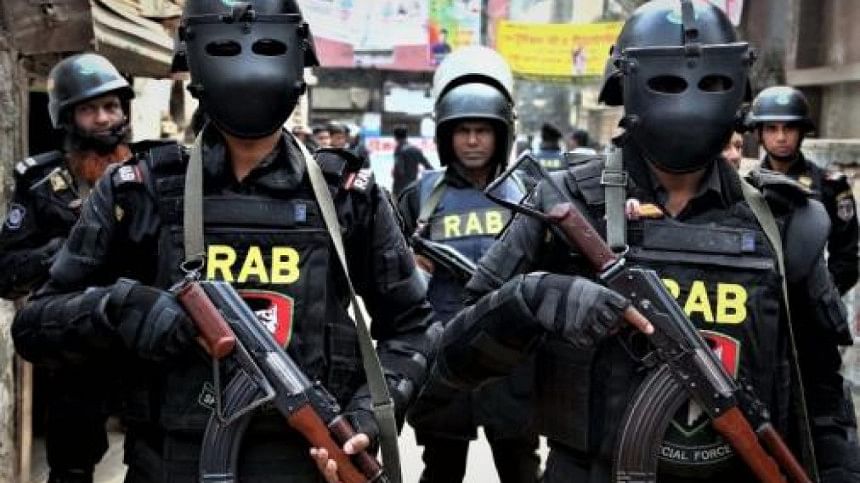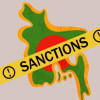Sanctions on Rab ‘worked like a tonic’

US sanctions on the Rapid Action Battalion "worked like a tonic", rights activists said yesterday as the number of extrajudicial killings and enforced disappearances dropped significantly in the last year.
However, they said, rights abuses targeting the opposition political parties and curbs on freedom of speech remain a matter of concern.
The US on December 10, 2021, imposed sanctions on Rab and seven current and former top officials of the elite force, including former inspector general of police Benazir Ahmed and also the current IGP Chowdhury Abdullah Al-Mamun, in connection with serious rights abuses.
It said Rab and other Bangladeshi law enforcement forces are responsible for more than 600 enforced disappearances since 2009 and nearly 600 extrajudicial killings since 2018. They are also accused of torture.
According to rights groups, those incidents mainly targeted opposition party members, journalists, and human rights activists.
Rights activists say the US sanctions also helped to improve the overall human rights situation in Bangladesh.
"After the US sanctions, only four to five people were killed in so-called gunfights and a few people were the victims of disappearance. The disappeared were also later handed over to the court or released in subsequent weeks," said Ain O Salish Kendra (ASK) Executive Director Nur Khan.
"I think the sanction worked like a tonic," the noted rights activist told The Daily Star.
According to ASK, four people were killed in "gunfights" with law enforcers till November this year. Rab was involved in all those incidents.
At least 34 people were victims of enforced disappearance in 2018, the year of the 11th general election, which came down to 4 in 2022, according to ASK data.
Nur Khan said extrajudicial killings in the name of "gunfights" have been going on for decades. It came down almost to zero after the killing of Major (retd) Sinha Mohammad Rashed Khan in July 2020, only to rebound after a few months.
"However, after the US sanctions, the numbers came down because there was psychological pressure on the government. It proves that such incidents increase, decrease or stop if the government wants," he said.
However, rights groups say, repression against the opposition or dissenters has not dipped in this time period.
At least seven leaders and activists of the Bangladesh Nationalist Party have been reportedly killed in police firing during clashes in political rallies since late July this year.
The latest crackdown on BNP central office in Nayapaltan on Wednesday resulted in the death of one man. Besides, police have arrested at least 4,500 people including top BNP leaders on various charges across the country in the last week.
The BNP alleged that most of the arrestees are their partymen who have been framed in "ghost cases" ahead of BNP's December 10 rally. Police denied the allegations and claimed they have arrested criminals.
Nur Khan said targeting the opponents and dissents, filing ghost cases, making mass arrests, stopping public assemblies by force, gagging the voices of dissidents and curbing media freedom by using the Digital Security Act are all expressions of an autocratic rule.
Human rights defenders say rights abuses by law enforcers on the opposition parties would not stop until the authorities stop using police in repressing the opponents or dissents for political purposes.
Talking to The Daily Star, Home Minister Asaduzzaman Khan Kamal yesterday refused to link the reduction of extrajudicial killings and enforced disappearances with the sanctions.
"I have always said that they [victims of disappearance] went into hiding or fled after committing heinous crimes. There are no instances of enforced disappearance in our history…Anyway, if they [rights activists] think that it has been decreased, we think, it's good."
On police repression of the opposition party, the home minister said police have not targeted the opposition or any particular party. Law enforcers are carrying out their job according to the rules of the country, he added.
Terming such political deaths and arrests unfortunate and violation of human rights, Professor Dr Mizanur Rahman, former chairman of the National Human Rights Commission, questioned the statements of foreign ambassadors regarding rights issues.
"Human rights concern from the foreign ambassadors in Bangladesh is also questionable. We have to look closely if those statements are part of geopolitics or attempt to put pressure on Bangladesh," he told this correspondent.
Since the sanctions, Bangladesh has also taken a number of steps to improve ties with the US. It has also increased reporting of the human rights situation in the country to the UN and other related organizations.
In February this year, Bangladesh appointed a lobbyist firm, Nelson Mulins, to maintain relations with the US government. The firm will work along with the PR firm BGR Group, which was appointed by the government earlier.
The foreign ministry also appointed a law firm, which will try to get the sanctions lifted through legal means.
Besides, the government has set up a separate desk led by a director under the UN wing of the foreign ministry to look after human rights issues and provide proper reports to the UN and other organisations concerning human rights.
The foreign ministry has also created an inter-ministerial taskforce under its leadership. Other agencies involved in the taskforce include the ministries of home affairs, law, DGFI and NSI. The taskforce holds meetings monthly.
"We review the human rights situation and suggest the ways on how to improve it," a foreign ministry official told The Daily Star.
"We took all these measures not only because of sanctions on Rab but because human rights is one of our priorities," he said.

 For all latest news, follow The Daily Star's Google News channel.
For all latest news, follow The Daily Star's Google News channel. 









Comments